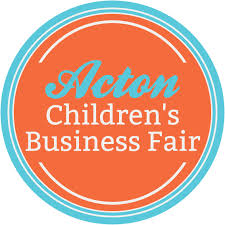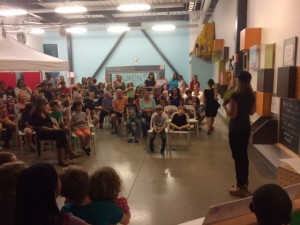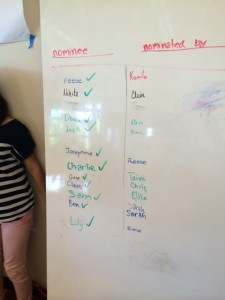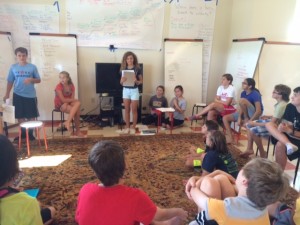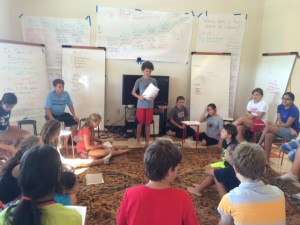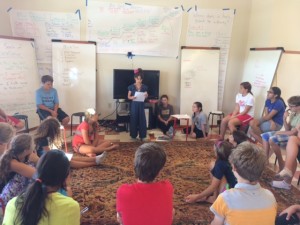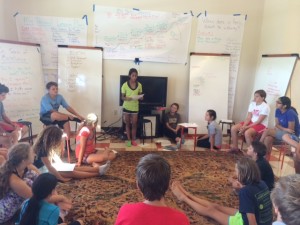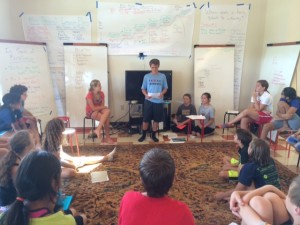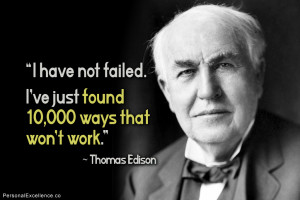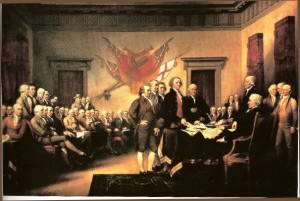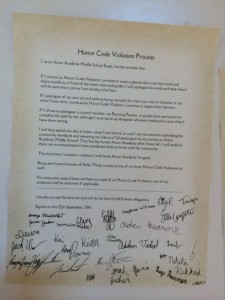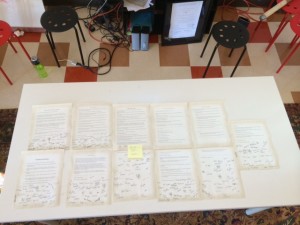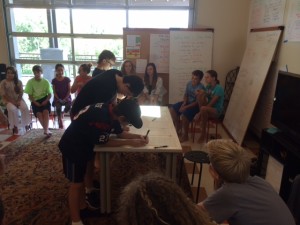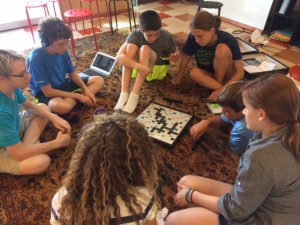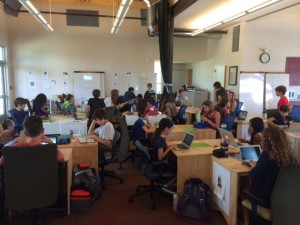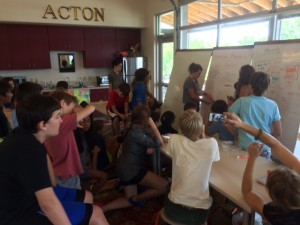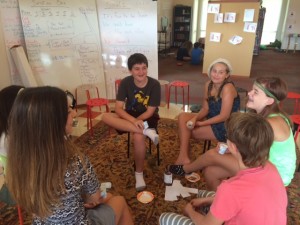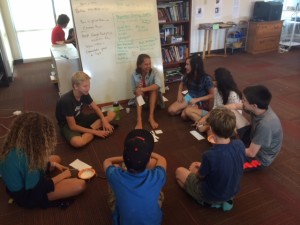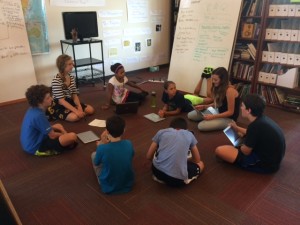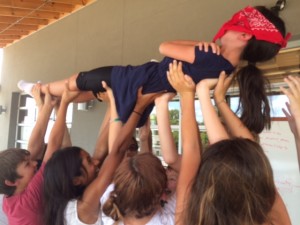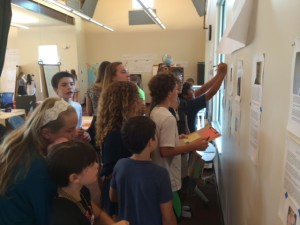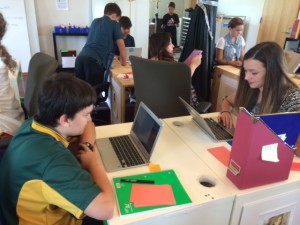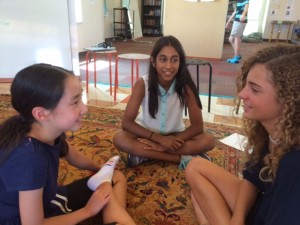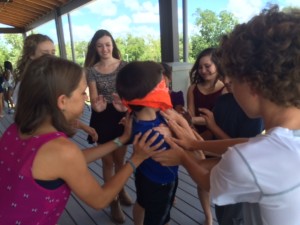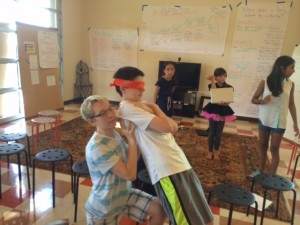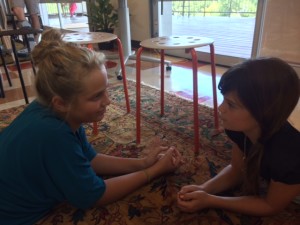
We were blessed by a visit last week from Clark Aldrich, sim-Guru, author of Unschooling Rules and in many ways an intellectual Founding Father of Acton Academy. Below is his unedited report: (Warning – this is an especially long post.)
Thoughts on Acton Academy
It seems that Acton Academy is an incredible success. The question is not if the school approach is a great one, but more, why and how might it appropriately grown and evolve?
In some ways, Acton reminded me of corporate story I researched a while ago. There was a very successful manager at Gallop. She ran a virtual team. No one could understand why she got such strong results. It turns out she spent almost half of her valuable weekly management call with her team discussing personal and non-work issues. She believed, rightfully, that this investment in her group getting to know each would payoff in greater collaboration, productivity, and work satisfaction.
Culture
The “secret sauce” of Acton Academy is the strong and unique culture. The culture itself could be compared accurately to a great corporate culture such as Southwest Airlines.
The culture is created in dozens of aligned ways, from the leadership to group building activities to rules of engagement to mission. And this investment in culture pays off many dividends:
- Acton has productive self-work time. This has also allowed Acton to do an extraordinarily good job at offloading some of the traditional high-teacher effort activities such as math.
- The culture successfully uses a lot of peer interactions for coaching, work products, and evaluations, including one-on-one, small groups, and full-group presentations.
- The community itself is very good at self-policing. When the noise or other ruckus grew, typically it was a student, not a coach, who intervened and controlled the group.
This culture is now so worked into the environment that students carry it on from year-to-year. The culture has inertia. Students are stewards of the culture as much as the adults.
This “value of culture” requires, if I may be blunt, not letting in the students who are not compatible with the culture. Certainly students will thrive in Acton who do not thrive in industrial schools, and vice versa. But as Acton becomes more successful, the impulse to “help” certain students who are not good fit will grow, and should be fought. Cost containment also gives Acton control over its culture. We all know of traditional schools that have had to compromise by accepting and keeping the wrong students in order to get full board, which has led to their eventual demise.
I imagine it will be very difficult to start up a new acting Academy and have to create the culture from scratch, especially where there is an expectation on anyone’s part – coach, student, or parent – of a traditional industrial education model. I believe counselors for the very best camps will be a logical pool of talent with the right instincts.
Further, the success of the implementation of a full high school program, with the abundance of hormones and the persistent threat of drugs, will work only if there is a significant stream of students already stewards of the culture from middle school. Introducing “new” students into the high school program will be a bigger risk and thus should be done at a lower percentage and with more care, if possible, even than done at the middle school level.
Badges and Bucks
Badges are completely understood, along with Eagle Bucks, as the currency of the environment. It is reasonable to assume the role of badges will grow considerably in the next few years, including as a structuring framework for the leadership of new Acton Academies. The badges eco-system may evolve:
- To include different levels of badges, perhaps one to five stars in magnitude.
- More external recognition in the marketplace. Internships may be granted, by smart companies, only to student who have earned certain, very specific badges, in both technical and leadership/inter-personal areas.
- To include a system that always presents five or six open badges, unlocking new ones as old ones are completed, much as an adventure game would.
Libraries
Many activities are not stored or structured. There is a make-it-up-as-we-go along environment. This is currently very effective. But I do not know how best practices will flow from Acton Academy to Acton Academy.
Writing
Writing may be a challenging place to develop deep levels of skills. Until there is an equivalent of Kahn Academy for writing, this may be a tricky to maintain a non-directive culture. Ironically, most writing itself is a directive. One might wonder if branching stories may end up being a genre of choice, bridging the gap between web pages and traditional writing, as much as directive and collaborative leadership, and even a bit of simulation style modeling. (Certainly one could image part of any kit to propagate Acton beliefs coming in the form of branching stories as well.)
Tapping Additional Real Ecosystems
There may be an opportunity for real feedback from ecosystems, including gardens, even bird feeders, to augment the critically important internships. Finally, kitchen facilities with some students preparing meals for others may also encourage community and real activities, as I am sure is done on any field trips.
Positives Framed as Negatives
I can imagine Acton champions will face a barrage of useless challenges and fake criticisms. In many cases, the strengths of the school will be reframed as weaknesses. Here are some traditional fake criticisms, with some generic responses, put forth here as a bit of inoculation:
1. This only works because of a specific leader/teacher:
There are no strong educational programs that do not have strong leaders. Ever. Anywhere. At all. The worst corporations treat employees as interchangeable widgets as well.
2) This would not work everywhere, for all students, and all of the time.
Despite the model propagated by foundations and PhD’s, education is not like a factory where immutable rules, once discovered, be can infinitely applied. Education is more similar, although obviously very different, to entertainment, which has to constantly evolve and provide options.
3) This is not a perfect solution.
New approaches should be evaluated based on if they are significantly better for some children than the alternatives, not how far they are from perfect. The goal has to be a rich educational ecosystem, not a single perfect model.
4) This only works because of who is accepted and who is expelled. This program is skimming the best students.
In successful education programs, culture is king. The wrong people in a great culture destroy the great culture. Some people, however, who are failures in one culture can be superstars in another.
5) This will not help test scores/this will not help my child get into the most selective college.
Successful performance on standardized tests cannot be the goal of education. Tests are trapped in a cycle of more efficiency measuring increasingly useless attributes. The most selective colleges are in their own bubble, where the assumption that “intensity of competitiveness” necessarily equals “value delivered” will increasingly be challenged. Having said that, more universities are creating more flexible ways to admit success students, and over time students with the skill developed by Acton will be in higher explicit demand.
6) There are ways students can cheat.
There are always going to be ways for students to cheat. Students in the default education model cheat all of the time. Cheating in traditional schools is the giant unspoken truth that threatens to destabilize all of our current industrial education model.
7) This approach works now but it may not always. Cracks will appear.
All approaches to education have to adapt, and be ever calibrated. Just as large corporations cycle between centralization and decentralization, or between innovation and incremental improvement, so too the best approaches will require constant calibration based on internal and external conditions.
I can imagine Acton tightening up standards for a year, then loosening them. Some changes should be thought of as temporary.
8) This has not been proven to work.
The current industrial classroom model has not been proven to work, and in fact has been proven not to work. New approaches cannot be compared against a default standard, because there is not default standard. But new approaches are critical, and Acton’s entry into the ecosystem is critical.
Conclusion
Along with the photographs, I took some video clips of moments throughout the day, not as proof statements but to capture snippets of what this approach looks and sounds like.
A) In the morning session, outsiders would be surprised that a student could lead a deep, serious conversation about morality. This speaks well for the student leader, of course, but also for the group of students who were willing to accept that leadership. As well, the “rules” of engagement, of how to productively participate, were already so well internalized. It seemed like an advanced MBA class. This was more remarkable given that the school year had so recently begun.
B) During the self-work time, I believe outsiders would be surprised at how well students got real work done “on their own,” working hard towards badges. There was neither stifling quiet nor chaos. It resembled a creative open-office setting of any successful company.
C) The work group assembled to look at quests and think about school rules and policies was impressive for its serious acceptance of the problems and their role in the solution. It resembled any real world problem-solving task force.
D) The group challenge portion felt like the best summer camps, and perhaps a vision of the future workplace that integrates movement (see http://unschoolingrules.blogspot.com/2011/08/exuberant-animal.html) with lessons learned about self. Even then, one of the most impressive moments came when it was the students, not the coaches, who brought order to a loud room.
E) The reading assignment video clip showed how powerful peer to peer instruction could be. In this small group, the questions asked of each other (in deciding which of three or four pitched ideas would be accepted) were very sophisticated and truly supportive. Once again, even in peer groups, non-directive forms of leadership were being used.
F) The clean-up at the end was done with amazing vigor and competence.
G) Finally, the wrap up at the end closed the day, not with the traditional sense of parole, but with a satisfying conclusion, like the end of a great movie or play.
